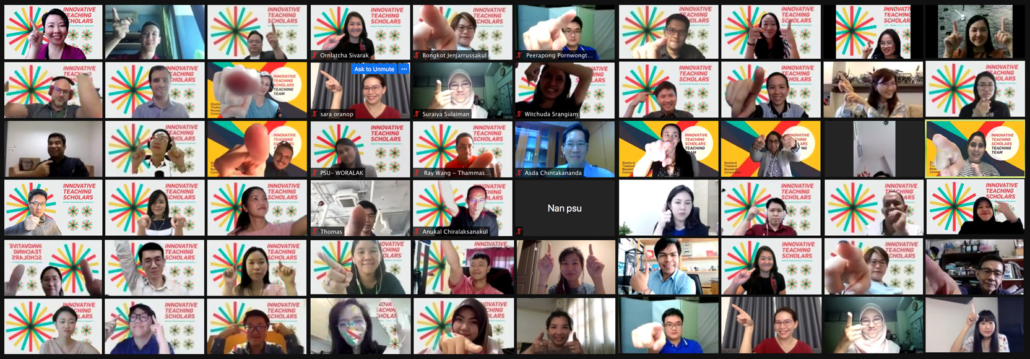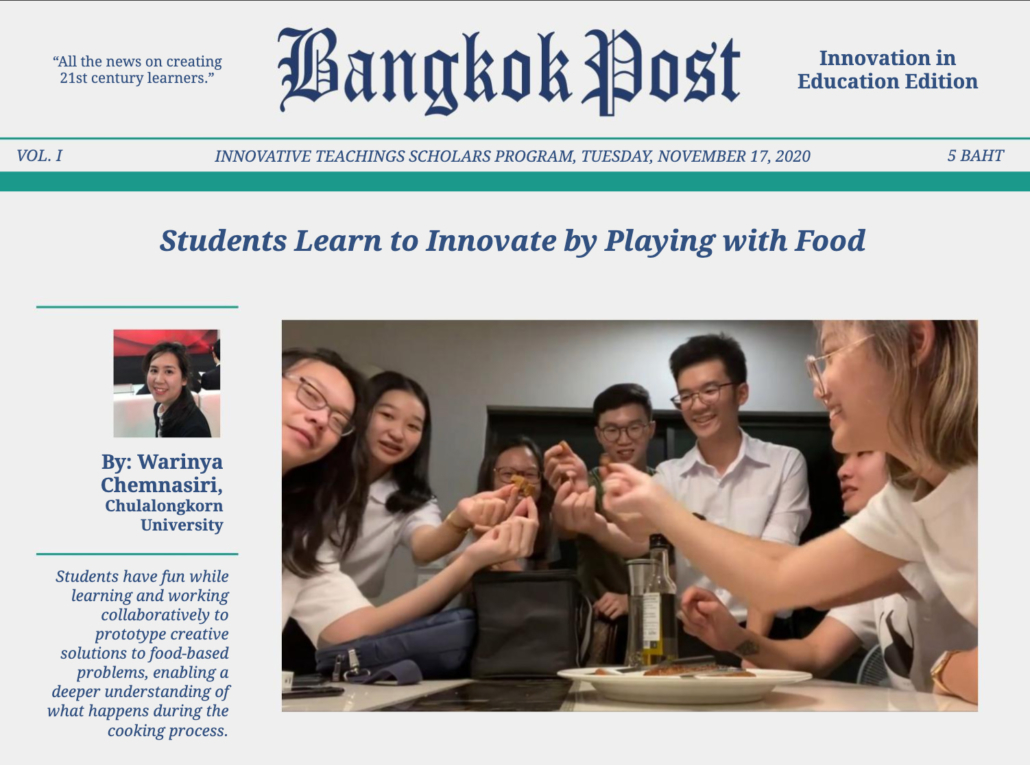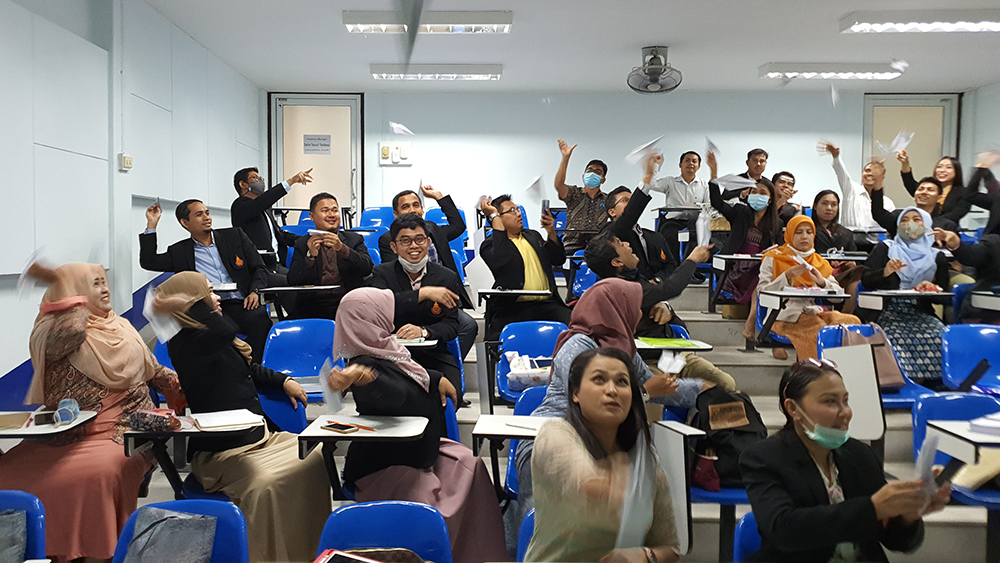A New Vision for Higher Ed in Thailand
Innovative Teaching Scholars Program Helps Thai Professors Unlock the Power of Student-Centric Learning
by LaRissa Lawrie, University Innovation Fellow
Wichita State University ’19; University of Missouri, PhD student
Thai professors are reimagining university education. They are on a mission to empower their students to be creative and purposeful leaders in an innovation-based economy. National technological and education strategies, like Thailand 4.0, are creating industrial and digital transformations in Thailand.
The Innovative Teaching Scholars (ITS) program helps educators explore new ways of teaching in order to equip students with 21st century skills for the economy of the future. The first cohort of ITS scholars received training in pedagogy from Stanford University from September 2020 through June 2021. The inaugural class of 50 professors have generated activities that are already giving their students new opportunities like practicing deep listening and improving their problem finding skills.
The ITS program is run by the Stanford Center for Professional Development (SCPD) and the University Innovation Fellows (UIF) program of the Hasso Plattner Institute of Design (d.school). The Stanford Thailand Research Consortium (STRC) supports the program at no cost to participating Scholars or their universities. The UIF team designed and created the ITS program based on the Teaching and Learning Studio workshop series.

A member of the teaching team, Leticia Britos Cavagnaro Ph.D., who co-directs the University Innovation Fellows Program, emphasized that the ITS program is learner-focused. “The program is designed around helping the cohort of scholars develop and grow as a ‘Community of Practice’ around teaching and learning,” said Cavagnaro. “Participants do deep dives into six pedagogical levers and explore how each lever can be activated to create new learning experiences or modify existing ones. The goal is for participants to become a reference and resource for other educators.“
There were two stages of the program. The first stage of the program was a fully interactive, “minds-on” experience. Scholars attend 9 weeks of virtual training, workshops, and activities. They had access to dedicated coaching in small groups and completed self-paced pedagogical experiments to improve their own courses. Stage one culminated in an open house where participants shared their projects with other educators, as well as university and industry leaders. Some examples of projects include spaces for creative teaching and learning, real-world challenges to engage students, and faculty professional development opportunities.
The second stage focused on building a community of practice through deepening their connections with one another and their expertise as innovative educators. During the second stage, scholars met as a cohort and in small peer groups with the dedicated support of a coach from Stanford. Scholars shared goals for their teaching and community. They also worked with fellow colleagues to overcome challenges in their teaching practice. Examples of this community of practice can be seen in scholars’ articles on Medium.
A unique aspect of the ITS program is the research component. In tandem with the teaching team, the program also has a research team that measures and analyses whether the program is meeting its goals. Preliminary analyses show that the program has had a positive impact. The majority of the ITS scholars felt that the program met or exceeded their expectations. Many noted that their views of teaching became much more focused on learners.
Due to the Covid-19 pandemic, many courses were moved online. The ITS program provided scholars with coaching through the transitions from in-person to remote teaching and strategies for creating successful remote learning experiences. One idea being “ambidextrous teaching,” the ability to teach a high-quality engaging class both in-person and online.
ITS scholar, Warinya Chemnasiri Ph.D., the Program Director in Integrated Innovation at the Chulalongkorn School of Integrated Innovation, is focused on giving her students hands-on opportunities even with online teaching. Chemnasiri developed a module on Nearpod that walked her students through the experimental process of creating an alternative meat from insects. The students all remotely followed the Nearpod module synchronously in their own homes while Chemnasiri was available to answer any questions. “I tried to find a way to let students experience and learn hands-on, even when they are at home and not in class,” said Chemnasiri.

“When I joined the program at the beginning my expectation was for there to be some workshops and I’ll learn a few things. I didn’t know we were really going to dig deep; I didn’t know that there would be tools, concepts, the dashboard – it’s really interactive,” Chemnasiri said. “I saw and heard a lot about the new way of teaching but when I got to experience it for myself, it’s really incredible.”
The program helped scholars investigate the “why” behind their course to prepare them to continue teaching regardless of the structure. Scholars also focused on developing curricula and content around their “North Star” or aspirational objective for their learners.
Another scholar, Warapark Maitreephun Ph.D. focused on active over passive learning as a method and the socioeconomic implications. He helps run the Prince of Songkla University’s Principal Preparation program where teachers train to become administrators (principals) in primary schools mainly in rural areas of Thailand.

Maitreephun implemented a project based on the Emoto Peace project that seeks to actively teach educators about positive communication. “If I teach a principal to use a new piece of technology and then that principal promotes that technology to teachers then it reduces the gap between students from rural areas and city areas,” Maitreephun said. “That’s why I’m interested in the ‘how’ I teach and improving the way I teach prospective school leaders.”
“What I teach will impact the school, school leaders, the students and their worlds,” Maitreephun said. “I want to pass the opportunity of the ITS program on to my students and their students and on.”
LaRissa Lawrie is a freelance journalist and writer. She’s currently getting her Ph.D. in Journalism at the Missouri School of Journalism. LaRissa is a Spring 2016 University Innovation Fellow and a 2019 Venture for America Fellow. Follow her on Twitter: @lawriecreative.


